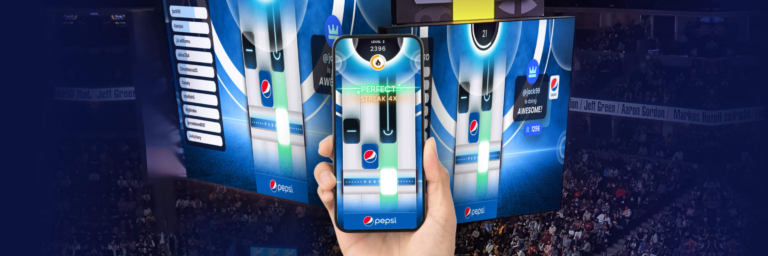Live trivia quizzes are more useful than you think. Here we explore virtual trivia for team building and how it improves worker engagement.
Keeping employees engaged at work is a critical task. It directly affects productivity and efficiency. Mixing up work with the occasional Live Trivia game is a great way to increase worker engagement and rally the troops! But not just any trivia will do, it’s crucial to make sure your game is more about fun and less about obligation.
Workplace games, though usually well-intended often fall well short of expectations. For employees, they can feel tedious. It’s no wonder why. About 95% of workers report feeling stressed at work. Adding one more thing to do, even if it is just a quiz, can be overwhelming.
To the well-intended employer who only wished to help, it can be very disappointing to watch a game go down in flames. Fortunately, virtual trivia for team building doesn’t have to be a source of stress.
The right techniques can help your team get much more out of team building exercises. Read on to learn about virtual trivia for team building and engagement.

Prelude
All of the suggestions listed below should be seen as just that. Suggestions. You know your team better than anyone. Generalizations can lay the groundwork for quiz success. However, it is equally important that you incorporate your insider knowledge into your trivia quiz building.
No one knows your team’s workplace preferences better than you. Use that intel to create an experience people will actually love, and you will find success.
The Problem
Before we dive into the solution, let’s take a more granular look at the problem. Workplace disengagement stats haven’t changed much in decades. Unfortunately, this seems to suggest that what it means to have disengaged employees isn’t fully understood.
- It’s Costly: Employee disengagement is incredibly pricey for employers. In fact, turnover costs American businesses $11 billion each year. Engagement boosting games like quizzes cost the smallest fraction of what it takes to replace someone.
- Disengagement Leads to Revenue Leakage: People who are disengaged don’t work nearly as well as people who are happy at work. In fact, a Gallup survey revealed that highly engaged employees outperform disengaged workers by 147%.
- It Impacts the Customer Experience: If your business sees your employees interact directly with the customer, disengagement is an enormous issue. Businesses with high engagement outperform those with low engagement by 89% when it comes to customer satisfaction.
- It Makes People Unhappy: There are concrete financial outcomes that come from having unhappy employees. Some of them are recorded above. Beyond the dollars and cents factor, however, there are ethical concerns that accompany having an unhappy staff. As an employer, you can do much to alleviate this concern by creating an environment focused on engagement.
One quiz probably won’t fix all of the problems listed above. However, ongoing efforts that target the problems that contribute to disengagement can make a big difference.
Schedule Appropriately
Your schedule sets the rhythm for the entire workweek. Introduce live trivia spontaneously in the middle of a Tuesday morning and some may be excited but others will be put off.
Nearly 70% report feeling burned out by the work they already have to do. Add another task into the mix unexpectedly, and you may actually increase stress and disengagement.
Instead, make sure that your quizzes are built into the schedule. By making team building exercises predictable, you allow your employees the opportunity to approach the opportunity with interest and excitement rather than dread and stress.
For example, you may wish to set thirty minutes aside every Tuesday morning for team building exercises. As long as you make sure the activity begins and ends at the stated time, employees will be able to fearlessly build the time into their schedules.
Scheduling your virtual trivia for team building also sends the message that these activities are being taken seriously.
When team building is embraced by management, enthusiasm may permeate from the top down. At the very least, your workers will understand that they are being expected to take the activity seriously. The right quiz will do the rest of the work.
While some workplaces may be skeptical setting aside time every week for interactive games, the results speak for themselves. Engaged workers are significantly more productive which more than makes up for the lost time.
Consider the Unique Characteristics of Your Employees
Workers really like being recognized by their employers. In fact, 40% of workers report that they would be more engaged simply if their boss acknowledged them more.
Using quizzes that recognize the unique interests of your staff can go a long way towards bridging the recognition gap. For example, if you know that several members of your team are voracious readers, you might consider devoting one quiz to the topic of literature.
You could even make a point of acknowledging that (for example) Henry, Gretchen, and Hannah would be good partners to have for this quiz. Not only will the three employees in question be flattered, but the entire staff will take note of the fact that you are paying attention.
No one quiz is likely to cater to each and every employee. However, after several weeks of quizzes, you may be able to effectively recognize your entire staff.
Optimize the Length
The average adult attention span is 12 seconds. That doesn’t mean adults can’t focus for longer than that. It just means they usually don’t.
If your quiz is really good it should claim more of their time. However, because the priority of these efforts is boosting engagement, it is important to factor for length.
Make the activity too long, and it won’t just get boring, it may also become stressful. Remember, most of your staff may very well feel overwhelmed already. Focus on fun and brevity and your staff will receive the benefits of team building without having it disrupt their day.
Make it Team-Based
When employees feel isolated, they are about 21% less engaged. Not only will that have a major impact on productivity, but it’s probably also not good for the well-being of your staff. Virtual trivia for team building should not be a solitary affair.
By dividing your staff into teams, you ensure everyone feels included and interested. While your staff may prefer selecting their own partners, you might find it prudent to rotate each week. A shocking 58% of employees say they trust strangers more than they do their coworkers. If you really want to boost engagement, that’s a stat you will want to address.
By switching teams up you help establish relationships that improve engagement and (hopefully) build trust.
Make Sure It Stays In Their Heads
Your virtual trivia for team building may only last thirty minutes or so. This time frame is completely appropriate for a workplace exercise. However, it’s not necessarily optimal for building real relationships.
Ideally, you will be able to create a quiz that lives inside your staff’s head for longer than the allotted time. Of course, that is something of a tall order for a game that has to compete with work, friends, family, etc.
No matter how good your questions are, it’s not reasonable for you to expect your staff to give them much thought after the game is over. However, the experience can live on if it is well orchestrated. Give these games a sense of occasion by making them as distinct and enjoyable as possible.
This might involve a Spin Wheel, recognition, leaderboards, workplace appropriate jokes, etc. Make this an opportunity for you to connect with your staff as well.
Employees tend to value management recognition. These games can be an excellent chance to do exactly that.
Make Virtual Trivia for Team Building Meaningful
Workplace friendships are incredibly meaningful, both for employee wellness and overall productivity. About 50% of people claim to have a friend at work. This stat leaves some room for improvement.
According to a Gallup poll, 70% of employees say workplace relationships are critical to performance. Another 58% say relationships are more important than pay increases.
Your virtual trivia for team building can be a great opportunity to make sure that your staff begins forming friendships. A good team-based structure is one way to get people in front of each other. However, the content of the quiz should also be conducive to conversation and friendship.
To maximize your quiz’s ability to bring people together, consider optimizing the content for your office. For example, you might find success in writing questions that involve people on staff. The key in this case, of course, is to keep the questions friendly and non-embarrassing. A question about who is most likely to bring an egg salad sandwich for lunch is funny and lighthearted.
The questions themselves don’t have to be profound. If your staff leaves the game understanding one another better, you will have done something right.
Incentivize Virtual Trivia for Team Building
People respond very well to incentives—especially in the workplace. About 86% of businesses use incentivization programs to reach their goals—and observe an 88% success rate doing it. In this case, your goal is increased engagement.
While it is difficult to incentivize an intangible like “engagement” it’s easier to incentivize effort. By creating good reasons for your staff to want to focus on your quizzes, you can help maximize the odds that they will have their intended effects.
How you incentivize matters less than actually doing it. The same is true of the prizes. Use the knowledge you have of your staff to pick prizes they will appreciate and you will maximize their impact.
Scaffold
Finally, when it comes to figuring out how to best create virtual trivia for team building, it’s important to make sure your efforts build off each other. Team building exercises work best when they are ongoing, but without proper planning, they can become tedious.
Rather than rotating between quizzes about film, books, sports, etc, try to make each quiz improve your team’s ability to work together.
For example, you may begin with quizzes that build relationships. You may then progress into quizzes that are specifically designed to test communication skills and other cooperative necessities.
Remember, quizzes in their own right, while fun, will not necessarily improve workplace skills. By targeting elements of behavior that are relevant to the job you boost engagement and proficiency.
Virtual Trivia for Team Building
You’ve learned a lot about how to make virtual trivia for team building and engagement. The focus should always be on fun. Employees that are comfortable with one another work a lot better.
A Harvard Business study once accurately predicted the success of collaborative efforts made by corporate teams. The metric they used to formulate their predictions? It wasn’t the education of the participants. It wasn’t even what they had accomplished in the past. Forecasters based their predictions on which teams were most comfortable with one another. This metric proved an accurate indicator of success for the very simple reason that teamwork matters.
All of the tips featured above were composed to form meaningful workplace connections. In optimizing your business for the collaborative success you improve engagement. Engaged workers are happy, happy workers are productive, it’s a win-win.




